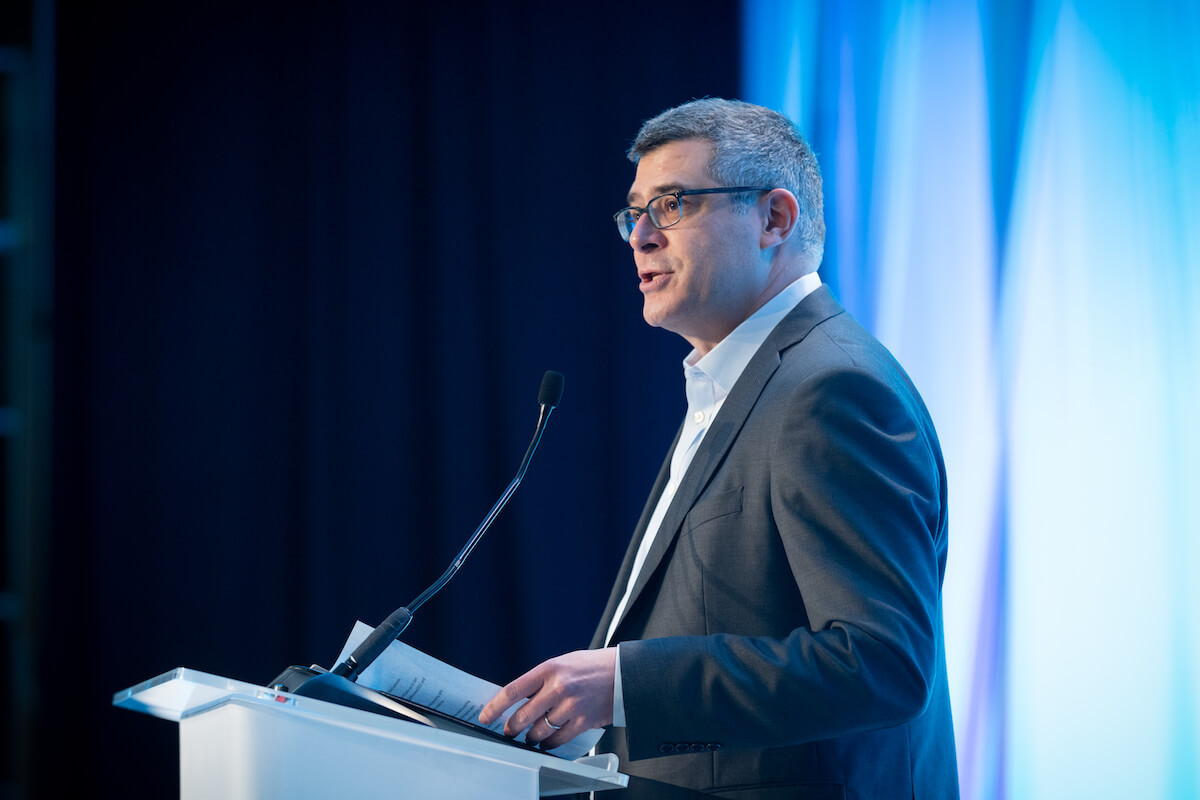Greetings, Agents of Impact!
Signals: Ahead of the Curve
SOCAP takes stock of impact investing in a changed world. The mood at this week’s impact investing gathering reflected not just the contrast between an online event and the annual schmoozefest on San Francisco Bay; on SOCAP’s virtual stage, impact investing leaders grasped to sum up “the state of the field” in a world gone crazy. Talk of market size and growth rates feels inadequate, noted Fran Seagull of the U.S. Impact Investing Alliance, who presented the annual update with Duke University’s Cathy Clark. The changes wrought by COVID have heightened the urgency of meeting basic needs like food, shelter, healthcare and education in new, more inclusive ways, with alternative proteins, regenerative farming, renewable energy, racial justice and reimagined economic systems. “We’re in an alternative-everything world,” said Mission Investor Exchange’s Monique Aiken, a contributing editor at ImpactAlpha, who joined Seegull and Clark. Some signposts from SOCAP:
- Leadership vacuum. We have a crisis of leadership, or more plainly, a lack of moral leadership,” said Ford Foundation’s Darren Walker in a fireside chat with Sir Ronald Cohen. With entrenched corporate interests and short-term thinking blocking change, “we have to think about what are the policies, the incentives that can actually change that reality,” Walker stated. Cohen noted optimistically that Procter & Gamble’s shareholders last week rebuked management over deforestation, part of an “investor rebellion” that was unthinkable only a short time ago. “I am putting all my faith in the change in values driven initially by young people who believe that our duty is to make money while improving the world,” Cohen said.
- Policy agenda. “We need an enabling policy environment” for impact capital to flow, said Seegull, who previewed the policy agenda in development by the U.S. Impact Investing Alliance. Initial recommendations: tax policies to transform community investment, a strengthened Community Reinvestment Act, and support for infrastructure and good jobs using the tools of development finance. The Trump administration has had impact investors playing defense on regulatory backsliding in the U.S. (see, “Another rule from the Department of Labor, another attack on ESG investing”). “We also want to think proactively,” Seegull said.
- Reimagining capitalism. One emerging element of the conversation: shifting power dynamics. Small funds such as the Boston Ujima Fund are prototyping community-led finance (see, “Local funds model the racial reckoning and renewal central to the COVID recovery”). Kataly Foundation’s Regan Pritzker and Beneficial State Bank’s Kat Taylor are moving money and power into communities. Taylor will shift a third of her wealth toward enabling community ownership. “Don’t confuse your fiduciary responsibility with an inability to move resources permanently into the hands of others,” said Pritzker. “If you’re in a philanthropic setting, it’s your duty to stay close to mission, and the tides are shifting.” Reimagining capitalism, underway before COVID, is squarely on the table, with the Alliance, Omidyar Network, Imperative 21 and the Global Impact Investing Network among the groups weighing in.
- Get caught up.
Investments in financial inclusion and agriculture deliver impact. ImpactAlpha has covered hundreds of investments aiming to drive access to finance and more sustainable agriculture. Two reports from the Global Impact Investing Network provide evidence of impact in each sector. The average financial inclusion investee, for example, provided first-time access to formal financial services to more than 136,000 individuals during a one-year period, according to an analysis of almost 800 financial inclusion investments from 46 investors since 2009. On average, agricultural investees helped boost incomes for more than 6,500 low-income farmers each year. More than 60% of all clients served by investees reported an increase in income across 661 direct investments from 38 investors since 2013. “We’re not just trying to rack up numbers of dollars or rupees, we are ultimately trying to achieve impact at scale,” the GIIN’s Amit Bouri told ImpactAlpha. “Impact measurement and management is going mainstream in a way that I think is really encouraging for the market’s development.”
- Transparency and comparability. The studies, along with earlier GIIN reports on investments in clean energy and housing, help investors answer the question: “What does good impact performance look like?” Bouri said. Average annualized, realized returns for financial inclusion investments stood at 9%; for agriculture, 10%.
- Demand for data. The COVID crisis has asset owners looking for evidence of positive impact (see, “Asset managers compete on impact as investors move beyond ESG”). Responding to that demand, asset managers “want to understand results and if they’re doing a good job,” says Bouri. The GIIN will release its impact-performance methodology, built on its IRIS+ system, for public comment on Nov. 12 (see, IRIS+ tool provides guidance to reset expectations for impact performance”).
- Share this post.
Dealflow: Follow the Money
Humana backs ‘health outcomes fund’ to expand addiction treatment and support services. The healthcare network is investing $5 million to enable nonprofit Volunteers of America to boost capacity and extend critical funding to local affiliates helping families cope with addiction. Community organizations are struggling to meet demand for their services as the pandemic strains social safety nets and families face added financial and emotional pressures. Outcome-based funds are emerging as a solution to help nonprofits raise upfront capital from private investors, who get repaid as impact milestones are achieved (see, “Pay-for-success funds in San Francisco and Colorado raise $10 million for nonprofits”).
- Test drive. The fund, structured by Quantified Ventures, will allow local community organizations to offer Volunteers of America’s Family Focused Recovery services. The affiliates can borrow from the fund, and repay impact investors through the revenue they generate from health plan partners like Humana, explained Quantified Ventures’ Alison Rein. For healthcare networks like Humana, such experimental initiatives are a way of testing out “solutions to better serve their members,” she added.
- Read on.
Catalyst Fund secures $4.3 million to accelerate digital commerce in Ghana. Catalyst Fund supports local fintech entrepreneurs accelerating access to basic goods and services in emerging markets (see, “The Catalyst Fund’s gateway to financial services for the world’s next billions”). The Mastercard Foundation and Accra-based MEST are working with Catalyst Fund to help Ghana’s micro and small businesses adopt digital services, like electronic payments or managing inventory online. The Inclusive Digital Commerce Accelerator is looking to help scale companies that already work with at least 1,000 micro- and small enterprises in the country. The $4.3 million in funding from Mastercard Foundation will cover grants of up to $120,000 to participating startups.
- Lessons from China. The program is a direct response to the pandemic, Catalyst Fund’s Maelis Carraro told ImpactAlpha. More than 90% of Ghana’s micro-enterprises saw sales fall by 60% or more when the COVID lockdowns started. In China, micro- and small enterprises that could operate digitally were more resilient during the pandemic “because they had a digital transaction history, and that gave them faster access to credit,” Carraro said. “We saw an opportunity to apply our model to accelerate Ghana’s digital commerce ecosystem.”
- Small business customers. In partnership with relief organizations in Kenya, Sokowatch launched an e-voucher program to help its network of informal retailers, or dukas, generate income while providing food for struggling families. “That could only be done by a company that had that kind of reach with small retailers,” said Carraro. Other fintech companies supported by Catalyst Fund also pivoted to respond to the needs of small business customers.
- Growing fintech. Catalyst Fund is expanding its fintech accelerator and investment activity with a $15 million grant in January from J.P. Morgan and the U.K.’s Department for International Development. Its latest cohort launched in June.
- Dig in.
Unreasonable Group launches diverse investing collective. The social impact accelerator Unreasonable Group has for a decade offered mentorship, networks and resources to high-growth, high-impact entrepreneurs – without taking a financial stake. Through the new Unreasonable Collective, individuals can pool their money to invest in the ventures of Unreasonable’s more than 234 global fellows. The ventures, in agritech, alt-protein, digital health and other sectors, have together raised $4.7 billion and so far generated a total of $3.7 billion in revenue. Unreasonable’s Pratibha Vuppuluri told ImpactAlpha that the idea is to promote a more inclusive form of impact investing, with women and people of color making up at least half of its investors. A diverse investor base can “come in with smart capital and smart perspectives,” says Vuppuluri.
- Reasonable terms. The Collective will co-invest with up to $1 million in later-stage rounds of up to $25 million that have a lead investor. Unreasonable will forego a management fee but will charge annual dues and take 15% of the Collective’s profits. Membership is initially open to U.S.-based accredited investors. The Collective has signed up 30 members and expects to announce its first deal within weeks.
- Join in.
Heila Technologies scores $2.5 million to improve minigrid performance. Renewably-powered minigrids are made up of many different components, from solar panels to batteries to charge controllers, that are often produced by different manufacturers and aren’t designed to communicate optimally. Boston-based Helia makes a hardware- and software-based system that helps minigrids operate efficiently and respond to power demand by streamlining how different power sources connect into the minigrid network. Infrastructure investor Table Rock Infrastructure Partners and Massachusetts Clean Energy Center backed the round.
Agents of Impact: Follow the Talent
RHIA Ventures is recruiting a chief executive officer in San Francisco… The winners of MassChallenge’s 2020 U.S. accelerator programs will be announced today, Oct. 22 at 5pm ET… The Croatan Institute is hosting “Place-based perspectives on conservation finance and forestry” featuring Croatan’s John Fenderson, Peter Stein of Lyme Timber, Amrita Vatsal of EFM Investments, Oliver’s Agroforest’s Olivia Watkins, Wednesday, Oct 28.
Thank you for reading.
–Oct. 22, 2020











